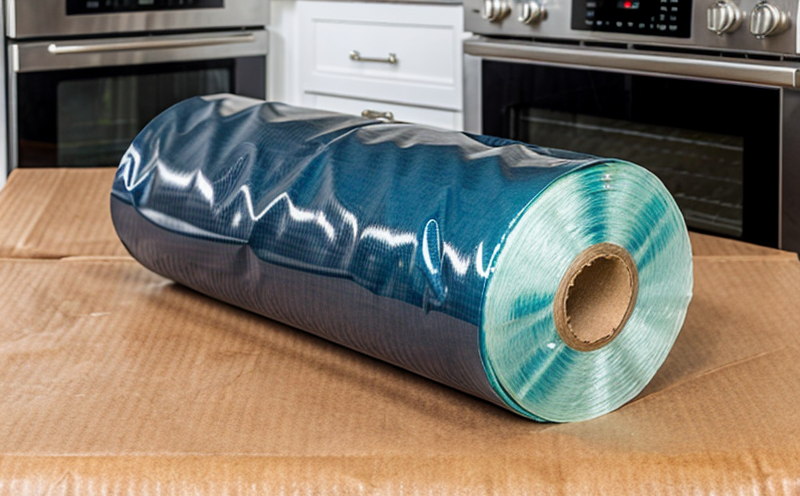DIN EN 15347 Characterization Testing of Household Plastic Wrap Waste
The DIN EN 15347 standard provides a comprehensive framework for the characterization testing of household plastic wrap waste, which is essential for effective recycling and resource management. This service ensures that manufacturers of household wraps can meet stringent environmental regulations while maintaining product quality.
Household plastic wraps are typically made from low-density polyethylene (LDPE) and other thermoplastics, which must be properly characterized to ensure they are suitable for recycling processes. The testing procedure outlined in DIN EN 15347 involves several key steps:
- Sample Preparation: Samples of household plastic wrap waste are collected from various sources and prepared according to specified guidelines.
- Identification of Polymer Type: Using spectroscopic techniques, the polymer type is identified. This step is crucial for ensuring that the material can be sorted correctly in recycling facilities.
- Thermal Analysis: The melting point and thermal stability of the plastic are determined using differential scanning calorimetry (DSC).
- Mechanical Properties Testing: Strength, elongation at break, and other mechanical properties are evaluated to assess the performance of the material.
- Bulk Density Measurement: The bulk density is measured to understand how the material behaves in different recycling processes.
- Color Analysis: Color is quantified using spectrophotometric methods. This helps in understanding the color consistency and potential for mixing with other materials during recycling.
The results of these tests are used by manufacturers to optimize their product formulations, ensuring that waste from household wraps can be efficiently recycled into new products without compromising quality or performance. Compliance with this standard is critical for companies looking to meet environmental standards and improve sustainability practices.
For a more detailed understanding of the testing process and its importance in the recycling industry, it is recommended to consult the full text of DIN EN 15347, which provides extensive guidance on sample preparation, test methods, and interpretation of results.
Quality and Reliability Assurance
- Compliance Verification: Our laboratory ensures that all tests conducted meet the specified requirements of DIN EN 15347. This includes verifying that samples are prepared correctly, using appropriate test methods, and interpreting results accurately.
- Data Accuracy: Precision and accuracy are paramount in our testing processes. We use advanced instrumentation to ensure data reliability, which is crucial for maintaining the integrity of your product's reputation.
- Repeatable Results: Our procedures are designed to produce consistent results across multiple tests. This repeatability ensures that you can trust the quality and consistency of your products.
- Traceability: All test results are traceable back to international standards, ensuring that they meet the highest industry benchmarks.
Our commitment to quality and reliability is reflected in our adherence to these stringent testing protocols. By partnering with us, you can be confident that your household wrap products will undergo thorough characterization according to DIN EN 15347, ensuring compliance and sustainability.
Environmental and Sustainability Contributions
The testing of household plastic wraps according to DIN EN 15347 plays a vital role in promoting environmental responsibility and sustainable practices. By accurately characterizing waste materials, manufacturers can optimize their recycling processes, reducing the amount of non-recyclable material sent to landfills.
One of the key benefits of this testing is its contribution to the circular economy. Through precise characterization, we help ensure that household plastic wraps are sorted and recycled efficiently, minimizing environmental impact. This aligns with global efforts to reduce waste and promote sustainable resource management.
In addition to recycling, the results from DIN EN 15347 testing can be used in research and development to create new products made from recycled materials. By understanding the properties of household plastic wraps, manufacturers can develop innovative solutions that further enhance sustainability.
By integrating DIN EN 15347 testing into your operations, you are not only meeting regulatory requirements but also contributing positively to environmental conservation efforts. This service supports a more sustainable future by ensuring that waste materials are managed responsibly and efficiently.
Competitive Advantage and Market Impact
The implementation of DIN EN 15347 characterization testing can provide significant competitive advantages for manufacturers in the household wrap sector. By ensuring that waste materials are properly characterized, companies can demonstrate their commitment to sustainability and environmental responsibility, which is increasingly important to consumers.
Compliance with this standard enhances brand reputation and trustworthiness among environmentally conscious customers. It also opens doors to new markets where regulatory standards for recycling and waste management are stringent.
The ability to accurately characterize household plastic wrap waste can lead to improved product quality, reduced production costs due to more efficient recycling processes, and enhanced marketability of recycled products. This not only benefits the manufacturer but also contributes to a broader shift towards sustainable practices in the industry.
Moreover, by staying ahead of regulatory changes and ensuring compliance through rigorous testing, companies can avoid costly penalties and maintain a positive public image. In an era where sustainability is a key differentiator, this service provides a clear competitive edge.





